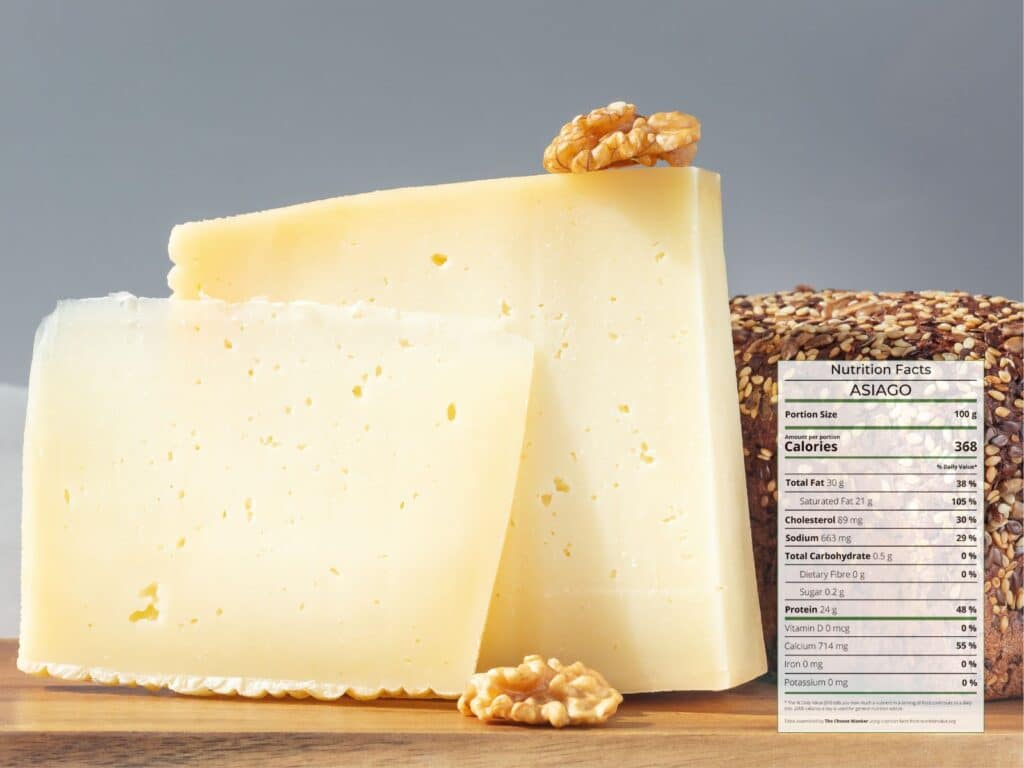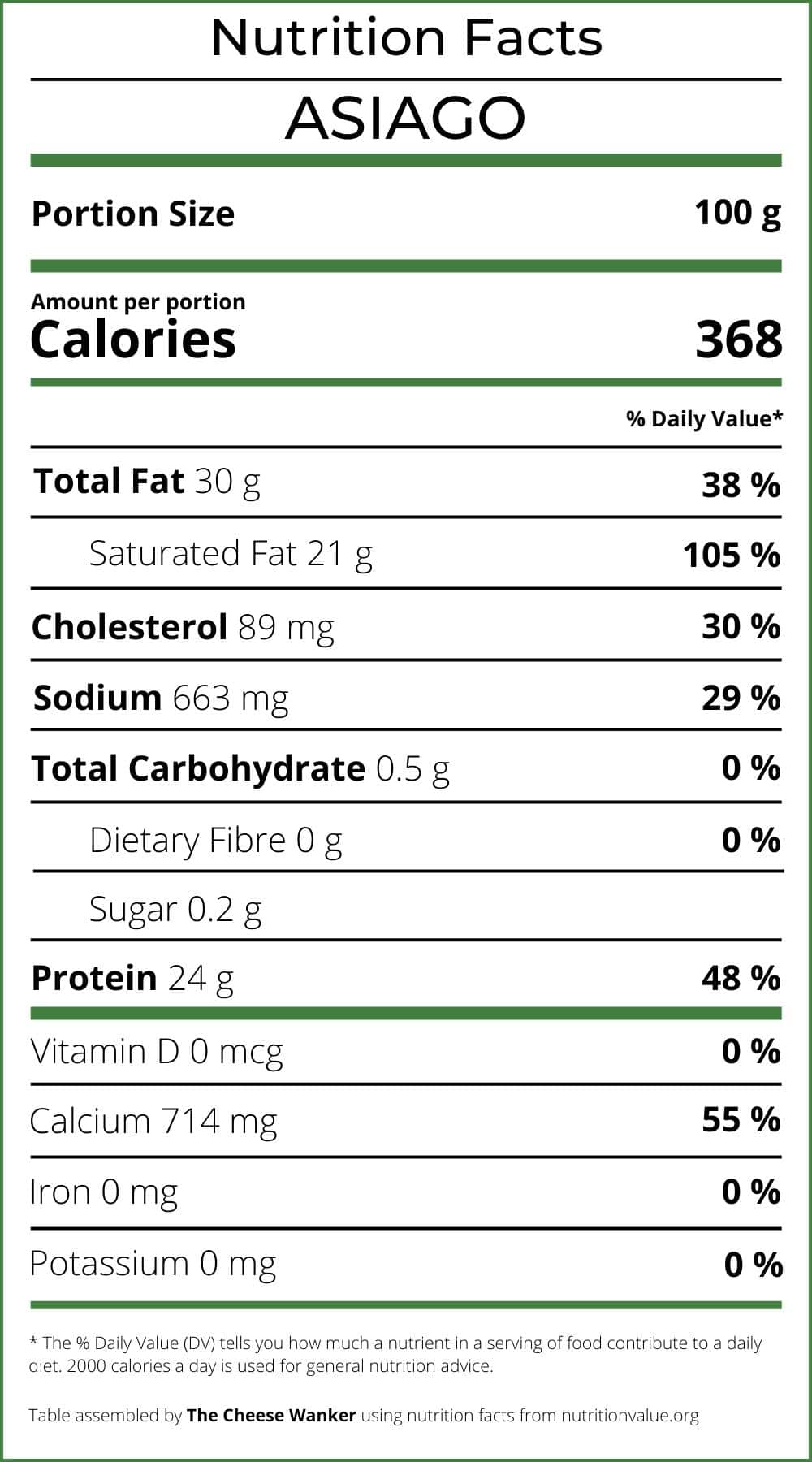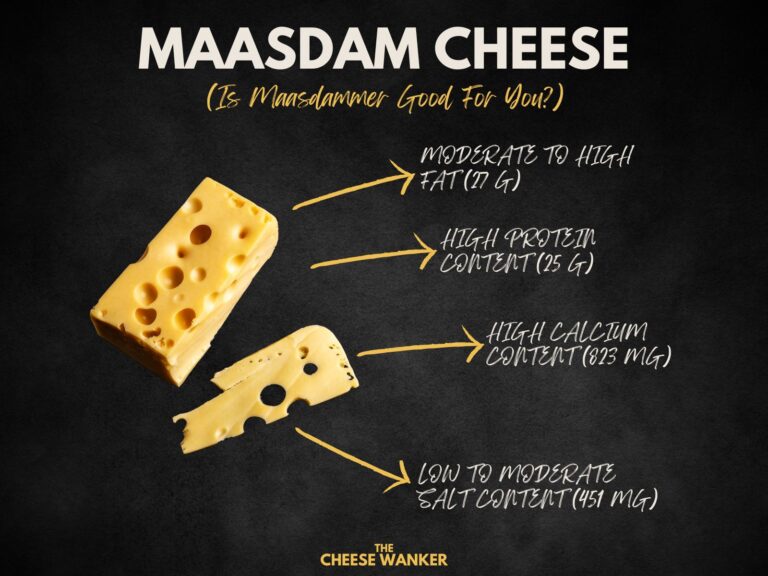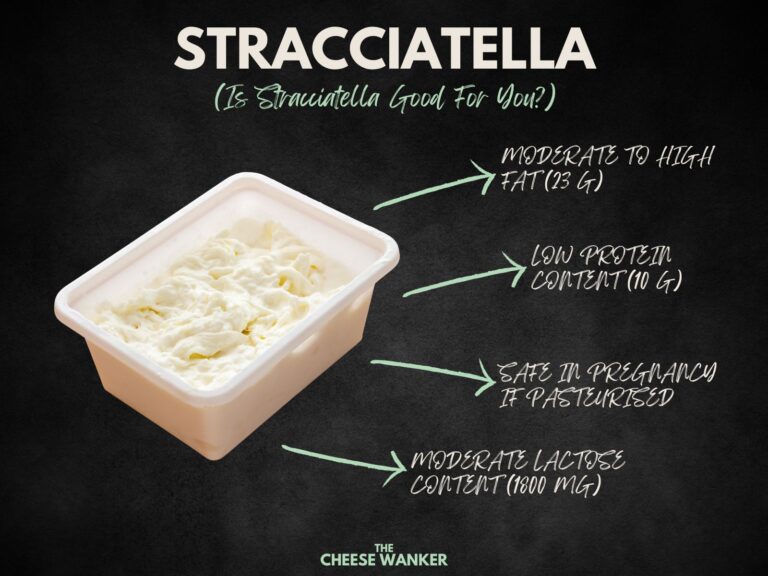Welcome to the world of Asiago, an Italian cheese renowned for its rich flavours and versatility. This article delves into the nutrition facts of Asiago cheese, exploring its components, benefits and considerations. Read on for valuable insights into this delectable cheese that can enhance your culinary experiences.

SEE ALSO: Nutrition facts for popular world cheeses in The Cheese Wanker’s index →
What is Asiago?
Asiago cheese is a renowned Italian cheese originating from the northeastern region of Italy. This semi-hard cheese is made from cow’s milk and exhibits a delightful combination of nutty flavours and a firm, crumbly texture.
It is a versatile cheese that can be enjoyed on its own, grated over pasta dishes, or melted into a variety of recipes.
Nutrition fact sheet

Country of origin
Italy
Type of Cheese
Milk
Cow
Examples
Asiago Mezzano, Asiago Vecchio, Asiago Stravecchio, Asiago d’Allevo, Asiago Pressato
Safe
Pregnancy*, Keto Diet, Lactose Intolerance
Avoid
Milk Protein Intolerance, Low Sodium Diet
Nutritional review for Asiago Cheese
Eating healthy plays a pivotal role in maintaining overall well-being and preventing chronic diseases. A balanced and nutritious diet provides our bodies with essential vitamins, minerals, and macronutrients, fuelling optimal physical and cognitive function.
With this in mind, let’s have a look at some of the key nutrition facts for Asiago.
Lactose Intolerance
For those with lactose intolerance, the good news is that Asiago cheese contains minimal lactose. During the cheesemaking process, most of the lactose is converted into lactic acid by bacteria cultures.
This makes Asiago cheese a suitable option for individuals with lactose intolerance who still wish to indulge in the pleasure of cheese.
Fat Content
Asiago cheese contains a moderately high fat content, which contributes to its rich and creamy taste. The fat content typically ranges from 25% to 31%. Moreover, those fats include healthy monounsaturated and polyunsaturated fats.
However, it’s important to enjoy Asiago cheese in moderation as part of a balanced diet, as excessive intake of high-fat foods can contribute to weight gain and related health issues.
You can learn more about the different types of fat in cheese and which cheeses have the lowest fat content here.
Cholesterol Content
While Asiago contains cholesterol, its consumption can still be part of a healthy eating plan. Moderation is key, as excessive intake of cholesterol-rich foods can potentially impact cardiovascular health.
Hence, incorporating Asiago cheese into a well-rounded diet, complemented by regular physical activity, is crucial for maintaining a healthy lifestyle.
Protein Content
Asiago cheese is a notable source of protein, an essential nutrient for numerous bodily functions. Protein aids in the growth and repair of tissues, supports immune function, and plays a role in enzyme and hormone production.
A 100-gram serving of Asiago provides approximately 24 grams of protein, making it a valuable addition to meet your daily protein requirements.
Want to find out which cheeses have the highest protein content? Click here for our blog post covering cheeses with the highest protein content.
*Safety in Pregnancy
During pregnancy, it is important to be mindful of food choices to ensure the well-being of both the mother and the developing foetus. Asiago cheese is generally safe to consume during pregnancy, whether it is made from raw or pasteurised cow’s milk.
Since Listeria contamination can still happen during handling, proper storage and food hygiene are essential. In addition to this, it might be advisable for pregnant women to avoid the rind of this cheese to further reduce the risk of contamination.
Of course, if you’re unsure of what you can eat during pregnancy, you should consult your healthcare professional to get a personalised plan. You can read more about which cheeses you can eat when you’re pregnant by clicking here.
Salt Content
Asiago, like many other cheeses, contains a moderate amount of salt (around 650-700 mg of sodium per 100 g). It is worth noting that excessive sodium intake may contribute to high blood pressure and other health concerns.
Thus, people on a low-sodium diet should be mindful of their Asiago consumption and consider selecting lower-sodium alternatives or enjoying it in moderation.
You can read more about why salt is important in cheesemaking in our comprehensive post here.
Calcium Content
Calcium, a vital mineral for strong bones and teeth, is abundantly present in Asiago cheese. A 100-gram serving typically provides around 55% of the recommended daily calcium intake.
Therefore, including Asiago into your diet can be an excellent way to boost your calcium levels, particularly for individuals who may not consume dairy products regularly.
Conclusion
Asiago, with its distinctive flavour and texture, offers more than just a culinary delight. It is a source of essential nutrients such as protein and calcium. While it contains moderate amounts of fat, cholesterol and salt, enjoying Asiago in moderation can be part of a healthy diet.
Those with lactose intolerance can also safely enjoy this classic Italian cheese due to its minimal lactose content. As always, it is important to consult with healthcare professionals or nutritionists to tailor your dietary choices to your specific needs and goals.
What’s your favourite way to enjoy Asiago? Leave us a comment below.
References
All the advice relating to what cheeses you can eat during pregnancy in this article is based on the recommendations by health authorities in Australia, the UK and the USA. If you are unsure about what you can or cannot eat, please consult your doctor.
Australia – FSANZ
United Kingdom – NHS
United Sates of America – FDA



